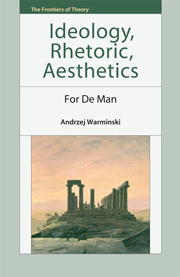Book contents
- Frontmatter
- Contents
- Series Editor's Preface
- Author's Preface
- Acknowledgements
- List of Abbreviations
- PART I Aesthetic Ideology
- PART II Hegel/Marx
- PART III Heidegger/Derrida
- 8 Monstrous History: Heidegger Reading Hölderlin
- 9 Discontinuous Shifts: History Reading History
- 10 Machinal Effects: Derrida With and Without de Man
- Appendix 1 A Question of an Other Order: Deflections of the Straight Man
- Appendix 2 Response to Frances Ferguson
- Index
9 - Discontinuous Shifts: History Reading History
from PART III - Heidegger/Derrida
Published online by Cambridge University Press: 05 October 2013
- Frontmatter
- Contents
- Series Editor's Preface
- Author's Preface
- Acknowledgements
- List of Abbreviations
- PART I Aesthetic Ideology
- PART II Hegel/Marx
- PART III Heidegger/Derrida
- 8 Monstrous History: Heidegger Reading Hölderlin
- 9 Discontinuous Shifts: History Reading History
- 10 Machinal Effects: Derrida With and Without de Man
- Appendix 1 A Question of an Other Order: Deflections of the Straight Man
- Appendix 2 Response to Frances Ferguson
- Index
Summary
Surely one of the most valuable “Legacies of Paul de Man” is the genuinely critical conception of history he draws out of the texts of the romantics. As is well known, romantic literature was, for de Man, a privileged locus for asking the question of history (in particular, the question of our history). Indeed, one could say that de Man's thinking of history – in fact, what he in his last essays calls “material history” or “the materiality of actual history” (and what no doubt constitutes one of the most valuable and enduring legacies he has bequeathed to us) – gets produced by his reflection on, and reading of, the romantics. But to say this may seem a bit odd, for de Man's own verdict on this work sounds much rather like the confession of a failure, in particular the failure to arrive at a “historical definition” of Romanticism. Looking back with some misgivings upon the essays collected in The Rhetoric of Romanticism – for him a “somewhat melancholy spectacle” in that it offers “such massive evidence of the failure to make the various individual readings coalesce” (RR viii) – de Man writes that these readings seem always to “start again from scratch and that their conclusions fail to add up to anything” (RR viii). He continues: “If some secret principle of summation is at work here, I do not feel qualified to articulate it and, as far as the general question of romanticism is concerned, I must leave the task of its historical definition to others.
- Type
- Chapter
- Information
- Ideology, Rhetoric, AestheticsFor De Man, pp. 173 - 184Publisher: Edinburgh University PressPrint publication year: 2013



